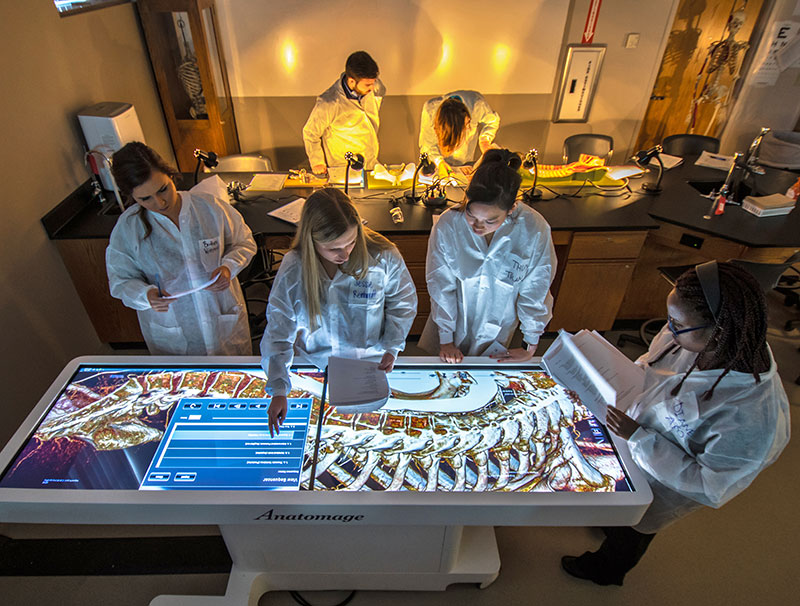
The first year or didactic phase of the curriculum provides students the foundation necessary for the clinical practice of medicine. This includes instruction in the applied medical sciences, patient assessment, clinical skills, principles of medicine and pharmacotherapeutics. The curriculum is delivered using an organ system based format, integrated across various courses, with a strong emphasis on active learning.
Other coursework includes medical ethics, PA professional practice issues, evidence-based medicine, along with population and public health. Students also participate in interprofessional educational experiences as well as numerous simulated patient interactions. The clinical phase of the curriculum focuses on direct patient care in various clinics, hospitals and health centers. The program offers a vast array of clinical opportunities with diverse and challenging patient encounters both in and outside of the Tri-State region.
PA PROGRAM CURRICULUM
| FIRST YEAR | ||
| SPRING SEMESTER | CREDIT HOURS | |
| PAS 505 | The Medical Interview and Physical Examination with Lab | 3 |
| PAS 585 | Preventive Medicine Across the Life Span & Population Health | 2 |
| BIO 515 | Human Anatomy for Physician Assistants with lab | 5 |
| BIO 520 | Genetics and Disease Screening | 3 |
| BIO 525 | Medical Physiology for Physician Assistants | 3 |
| PAS 550 | Clinical Approach to Behavioral Health | 2 |
| 18 | ||
| SUMMER SEMESTER | ||
| PAS 530 | Pharmacology I | 3 |
| PAS 535 | Principles of Medicine I | 4 |
| PAS 540 | Patient Assessment I with lab | 3 |
| PAS 545 | Clinical Skills in Medicine I with lab | 2 |
| PAS 515 | Evidence Based Medicine and Nutrition | 2 |
| 14 | ||
| FALL SEMESTER | ||
| PAS 500 | PA Profession: Evolving Issues in Medicine & Ethics | 2 |
| PAS 555 | Pharmacology II | 3 |
| PAS 560 | Principles of Medicine II | 6 |
| PAS 565 | Clinical Decision Making | 2 |
| PAS 570 | Patient Assessment II with lab | 3 |
| PAS 575 | Clinical Skills in Medicine II with lab | 2 |
| 18 | ||
| SECOND YEAR | ||
| PAS 600 | Family Medicine I Rotation | 5 |
| PAS 610 | Internal Medicine Rotation | 5 |
| PAS 620 | Emergency Medicine Rotation | 5 |
| PAS 630 | General Surgery Rotation | 5 |
| PAS 640 | Pediatric Rotation | 5 |
| PAS 650 | Behavioral Health Rotation | 5 |
| PAS 660 | Women’s Health Rotation | 5 |
| PAS 670 | Orthopedic Rotation | 5 |
| PAS 700 | Elective I Rotation | 5 |
| 45 | ||
| THIRD YEAR | ||
| PAS 705 | Elective II Rotation | 5 |
| PAS 708 | Elective –Special Populations Rotation | 5 |
| PAS 710 | Summative Evaluation | 4 |
| 14 | ||
| TOTAL CREDIT HOURS | 109 | |
Academic Progression
Progression to graduation with a Masters degree in Physician Assistant Studies (MPAS) requires the student successfully complete all first year didactic courses and subsequent clinical rotations with a minimum GPA of 3.0 and necessitates completion of the summative evaluation, where the student must successfully demonstrate competence in professionalism, medical knowledge, clinical skills, patient assessment and critical thinking. Students must complete all didactic courses in the sequence offered, and their clinical rotations within three months of the scheduled graduation date unless they have been granted deceleration.
Graduation
The Physician Assistant program follows the Mount St. Joseph University graduation requirements for graduate students, which are outlined in the graduate catalog. This requires that the student:
- remains in good academic standing (GPA of at least 3.0),
- successfully complete all components of the curriculum and
- settle all outstanding financial obligations to the University.
Students who graduate will receive a Masters degree in Physician Assistant Studies (MPAS) and are eligible to take the Physician Assistant National Certification Examination (PANCE).

